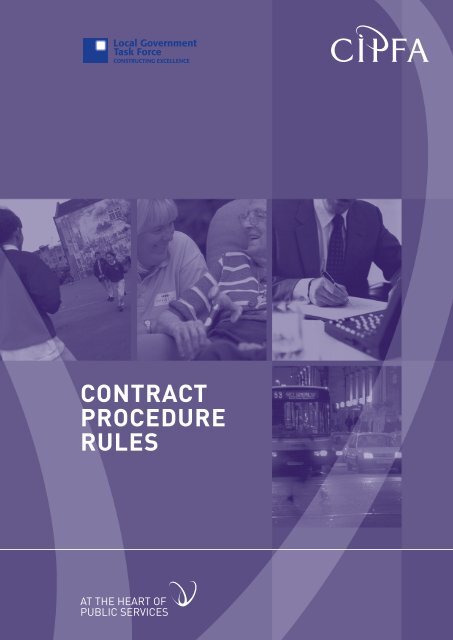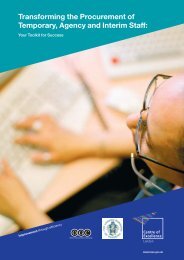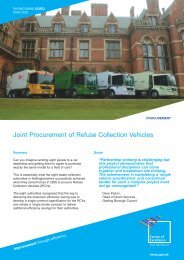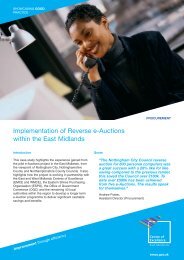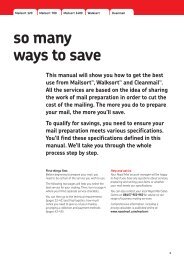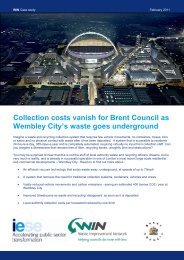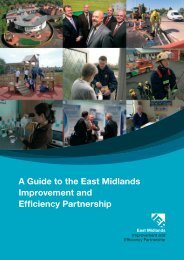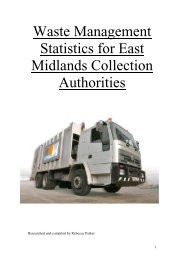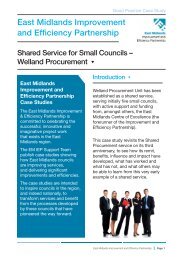CONTRACT PROCEDURE RULES - SPS Consultancy
CONTRACT PROCEDURE RULES - SPS Consultancy
CONTRACT PROCEDURE RULES - SPS Consultancy
Create successful ePaper yourself
Turn your PDF publications into a flip-book with our unique Google optimized e-Paper software.
<strong>CONTRACT</strong><br />
<strong>PROCEDURE</strong><br />
<strong>RULES</strong><br />
AT THE HEART OF<br />
PUBLIC SERVICES
The Local Government Task Force (LGTF) provides leadership for local authorities in delivering the<br />
Efficiency and Improvement agendas, particularly through the use of partnering and framework<br />
arrangements. It has targeted four key areas on which to focus current activity.<br />
The LGTF identifies exemplars of good practice, particularly those which support its current area<br />
of activity. These are disseminated to local authority practitioners through a variety of<br />
case studies.<br />
Contact the LGTF at www.lgtf.org.uk for information, support and resources on<br />
procurement issues.<br />
CIPFA is the leading professional accountancy body for public services, whether in the<br />
public or private sectors.<br />
We provide education and training in accountancy and financial management, and set and monitor<br />
professional standards.<br />
Our professional qualification is high-quality, relevant and practical, and is supported by a range of<br />
other products and services.<br />
CIPFA is a major publisher of guidance for practitioners and others with an interest in the public<br />
services. A comprehensive catalogue of titles is available free.<br />
Phone 020 7543 5602, fax 020 7543 5607 or email<br />
publications@cipfa.org for your copy.<br />
Why not visit our website?<br />
www.cipfa.org.uk/shop<br />
If you would like to subscribe to our free bimonthly e-newsletter advising on<br />
forthcoming and recently published titles, as well as upcoming events, please go to<br />
www.cipfa.org.uk/shop_subscribe.cfm and complete and submit the form.
<strong>CONTRACT</strong><br />
<strong>PROCEDURE</strong><br />
<strong>RULES</strong><br />
AT THE HEART OF<br />
PUBLIC SERVICES
Published by:<br />
CIPFA, THE CHARTERED INSTITUTE OF PUBLIC FINANCE AND ACCOUNTANCY<br />
3 Robert Street, London WC2N 6RL. Tel: 020 7543 5600 Fax: 020 7543 5700<br />
www.cipfa.org.uk<br />
© 2006, CIPFA<br />
Designed and typeset by Ministry of Design, Bath (www.ministryofdesign.co.uk)<br />
Edited by Sarah Lloyd (sarah@redlane.org.uk)<br />
No responsibility for loss occasioned to any person acting or refraining from action<br />
as a result of any material in this publication can be accepted by the authors or<br />
publisher.<br />
While every care has been taken in the preparation of this publication, it may contain<br />
errors for which the publisher and authors cannot be held responsible.<br />
ii<br />
<strong>CONTRACT</strong> <strong>PROCEDURE</strong> <strong>RULES</strong>
FOREWORD BY CIPFA<br />
Local authorities now take a wide view of<br />
procurement and are addressing the numerous<br />
issues within the National Procurement<br />
Strategy for local government which in 2003<br />
identified that local authorities spend over<br />
£40bn a year providing essential services to<br />
millions of people. Local authorities are also<br />
implementing the various initiatives associated<br />
with the Egan Rethinking Construction<br />
agenda.<br />
It is important that we all recognise the impact<br />
that efficient and effective procurement of<br />
goods, services and works have on service delivery. It is also vital that we<br />
procure in an efficient manner whilst ensuring that optimum solutions are<br />
delivered to assist the provision of high-quality front-line services to the<br />
public.<br />
To be fully effective it is vital that procurement processes operate<br />
within the framework of a council’s corporate procurement strategy<br />
that identifies the actions to be taken to ensure delivery of the council’s<br />
community plan and corporate objectives. In 2003, CIPFA, together<br />
with the Local Government Task Force, produced How to Develop a<br />
Procurement Strategy – A Guide for Local Authorities. This publication<br />
encouraged all those involved in procurement to look outside their<br />
specific work areas by considering the wider picture within their<br />
authority. It also advocated close working relationships between<br />
procurement officers and their auditors, with a view to removing the<br />
perceived obstacles to change.<br />
I am now very pleased to welcome this update of the example contract<br />
procedure rules that were included in the 2003 CIPFA publication. While<br />
not intended to be a model, they illustrate how such rules may be written<br />
in order to accommodate the principles of the National Procurement<br />
Strategy and the Rethinking Construction agenda. I therefore strongly<br />
encourage local authorities to use this document as the platform for<br />
undertaking reviews of their contract procedure rules.<br />
As with the earlier version, these example rules are based on those in<br />
operation at Cambridgeshire County Council and again have been<br />
produced in association with the Local Government Task Force.<br />
<strong>CONTRACT</strong> <strong>PROCEDURE</strong> <strong>RULES</strong><br />
iii
I would like to record my thanks and appreciation to Ken Odgers of<br />
Contractauditline for compiling these example rules and to Ian Stewart<br />
of Cambridgeshire County Council for commenting on the earlier<br />
drafts. The help and assistance provided by the Local Government Task<br />
Force, and in particular Peter Bishop, is warmly appreciated and CIPFA<br />
gratefully acknowledges the time and effort of all those involved in its<br />
production.<br />
Richard King<br />
Chair of CIPFA’s Audit Panel<br />
iv<br />
<strong>CONTRACT</strong> <strong>PROCEDURE</strong> <strong>RULES</strong>
FOREWORD BY THE<br />
LOCAL GOVERNMENT<br />
TASK FORCE<br />
Three defining reports – Egan, Latham and<br />
Byatt – have made a lasting impact on local<br />
government construction and as a result the<br />
industry is in a fitter position than ever before<br />
to deliver high-quality construction projects.<br />
Central to this success story has been the<br />
transformation of procurement. Procuring<br />
major projects is a complex and challenging<br />
business and, rather like a piece of music<br />
marred by a false note, so the constituent<br />
components of the procurement process must<br />
work together to deliver the desired outcomes.<br />
Local government will continue to face the dual challenge of improving<br />
its services while making them ever more efficient. Indeed, the pace of<br />
transformation must quicken and its reach must widen.<br />
That is why I am delighted to endorse these updated example contract<br />
procedure rules. In the search for ever better outcomes, we must examine<br />
all aspects of the procurement process to make sure they are fit for<br />
purpose and help deliver, not hinder, the transformation of our public<br />
services.<br />
Prepared by CIPFA in association with the Local Government Task Force,<br />
the example contract procedure rules represent an excellent example<br />
of two disciplines collaborating with a shared aim. I would urge local<br />
authorities to review their contract rules in line with these updated<br />
examples to ensure that the transformation of procuring local government<br />
construction projects continues apace.<br />
Roger Latham<br />
Chair of the Local Government Task Force<br />
<strong>CONTRACT</strong> <strong>PROCEDURE</strong> <strong>RULES</strong><br />
v
PREFACE<br />
The issue of the Byatt Report (Delivering Better Services for Citizens), and<br />
the subsequent National Procurement Strategy for Local Government,<br />
focused the attention of local authorities on the subject of procurement.<br />
In particular, it highlighted the need for authorities to widen their<br />
horizons by taking a corporate view of procurement issues. This<br />
includes a shift in emphasis from initial purchase costs and short-term<br />
savings to the examination of whole-life costs and establishing longerterm<br />
objectives to secure overall best value. Coupled with the National<br />
Procurement Strategy are the various initiatives associated with the Egan<br />
Rethinking Construction agenda.<br />
The best authorities recognise the critical contribution that procurement<br />
makes to the quality of the services delivered to their communities and that<br />
it must be seen in the context of the council’s overall objectives. Whilst<br />
economy is an essential ingredient of best value, it is also important that<br />
procurement decisions are taken in light of the broader objectives that the<br />
council is seeking to achieve. Effective procurement must therefore be<br />
measured as much by the social outcomes and community benefits that<br />
result as by the financial gains that are achieved. Balancing these two<br />
dimensions is at the heart of effective best value procurement.<br />
Most authorities have now produced corporate procurement strategies<br />
which reflect their corporate vision, plans and objectives. These strategies<br />
set out their approach for identifying opportunities for partnering and<br />
collaboration, letting authority-wide contracts and framework agreements<br />
and exploring various e-procurement initiatives. However, it is important<br />
that these authorities ensure that the delivery of their strategies is not<br />
obstructed by their contract procedure rules (often referred to as contract<br />
standing orders) which should encourage, rather than hinder, the<br />
widespread adoption of best practice.<br />
CIPFA, in association with the Local Government Task Force, has<br />
produced these updated example contract procedure rules. The example<br />
rules are intended to provide local authorities with a document that<br />
requires minimal adjustment and revision before it can be adopted by<br />
an individual authority. Authorities will need to ensure that the final<br />
document adequately reflects their corporate procurement strategies, and<br />
some tailoring may be required (eg financial thresholds and designated<br />
officers) to accord with provisions in their respective constitutions.<br />
Contract procedure rules are the link between the documented<br />
procurement strategy and the development of detailed codes of practice,<br />
training and the establishment of operational procedures. Therefore,<br />
once completed, it is envisaged that authorities will ensure that their rules<br />
are supported by a detailed purchasing guide and standard documents,<br />
preferably on their intranets, to steer the systems and procedures that are<br />
established at departmental level.<br />
vi<br />
<strong>CONTRACT</strong> <strong>PROCEDURE</strong> <strong>RULES</strong>
CONTENTS<br />
A BRIEF GUIDE TO <strong>CONTRACT</strong> <strong>PROCEDURE</strong> <strong>RULES</strong> 1<br />
SECTION 1: SCOPE OF <strong>CONTRACT</strong> <strong>PROCEDURE</strong> <strong>RULES</strong> 2<br />
1. BASIC PRINCIPLES 2<br />
2. OFFICER RESPONSIBILITIES 2<br />
3. EXEMPTIONS, COLLABORATIVE AND E-PROCUREMENT<br />
ARRANGEMENTS 3<br />
4. RELEVANT <strong>CONTRACT</strong>S 4<br />
SECTION 2: COMMON REQUIREMENTS 5<br />
5. STEPS PRIOR TO PURCHASE 5<br />
6. RECORDS 6<br />
7. ADVERTISING, APPROVED LISTS AND FRAMEWORK<br />
AGREEMENTS 7<br />
SECTION 3: CONDUCTING PURCHASE AND DISPOSAL 10<br />
8. COMPETITION REQUIREMENTS FOR PURCHASE,<br />
DISPOSAL AND PARTNERSHIP ARRANGEMENTS 10<br />
9. PRE-TENDER MARKET RESEARCH AND CONSULTATION 12<br />
10. STANDARDS AND AWARD CRITERIA 12<br />
11. INVITATIONS TO TENDER/QUOTATIONS 13<br />
12. SHORTLISTING 14<br />
13. SUBMISSION, RECEIPT AND OPENING OF<br />
TENDERS/QUOTATIONS 14<br />
14. CLARIFICATION <strong>PROCEDURE</strong>S AND POST-TENDER<br />
NEGOTIATION 15<br />
15. EVALUATION, AWARD OF <strong>CONTRACT</strong>, AND DEBRIEFING<br />
CANDIDATES 16<br />
SECTION 4: <strong>CONTRACT</strong> AND OTHER FORMALITIES 18<br />
16. <strong>CONTRACT</strong> DOCUMENTS 18<br />
17. BONDS AND PARENT COMPANY GUARANTEES 20<br />
18. PREVENTION OF CORRUPTION 20<br />
19. DECLARATION OF INTERESTS 21<br />
<strong>CONTRACT</strong> <strong>PROCEDURE</strong> <strong>RULES</strong><br />
vii
SECTION 5: <strong>CONTRACT</strong> MANAGEMENT 22<br />
20. MANAGING <strong>CONTRACT</strong>S 22<br />
21. RISK ASSESSMENT AND CONTINGENCY PLANNING 22<br />
22. <strong>CONTRACT</strong> MONITORING, EVALUATION AND REVIEW 22<br />
DEFINITIONS APPENDIX 24<br />
All costs stated in these contract procedure rules are exclusive of VAT,<br />
staff costs and fees.<br />
Terms appearing in the definitions appendix are italicised and<br />
capitalised.<br />
FURTHER ADVICE WITHIN OFFICE OF CORPORATE<br />
SERVICES:<br />
Legal Services<br />
Internal Audit<br />
Strategic Procurement and Contract Management Service<br />
viii<br />
<strong>CONTRACT</strong> <strong>PROCEDURE</strong> <strong>RULES</strong>
A BRIEF GUIDE TO<br />
<strong>CONTRACT</strong><br />
<strong>PROCEDURE</strong> <strong>RULES</strong><br />
These contract procedure rules (issued in accordance with section 135<br />
of the 1972 Local Government Act) are intended to promote good<br />
purchasing practice and public accountability and deter corruption.<br />
Following the rules is the best defence against allegations that a purchase<br />
has been made incorrectly or fraudulently.<br />
Officers responsible for purchasing or disposal must comply with these<br />
contract procedure rules. They lay down minimum requirements and a<br />
more thorough procedure may be appropriate for a particular contract.<br />
(For example, if Rule 8.1 would normally require that quotes be obtained,<br />
it might be appropriate in particular circumstances to seek additional<br />
quotations in writing or tender submissions. Equally, it may not always be<br />
appropriate to make use of an exemption under Rule 3 even if one might<br />
apply or be granted.)<br />
For the purposes of these rules, where there is a requirement for<br />
communication to be in writing, this shall be deemed to include e-mail<br />
and fax transmissions as well as hard copy.<br />
• Follow the rules if you purchase goods or services or order building<br />
work.<br />
• Take all necessary legal, financial and professional advice.<br />
• Declare any personal financial interest in a contract. Corruption is a<br />
criminal offence.<br />
• Conduct any Best Value review and appraise the purchasing need.<br />
• Check whether there is an existing Corporate Contract you can<br />
make use of before undergoing a competitive process.<br />
• Normally allow at least four weeks for submission of bids (not to be<br />
submitted by fax or e-mail).<br />
• Keep bids confidential.<br />
• Complete a written contract or council order before the supply or<br />
works begin.<br />
• Identify a contract manager with responsibility for ensuring the<br />
contract delivers as intended.<br />
• Keep records of dealings with suppliers.<br />
• Assess each contract afterwards to see how well it met the<br />
purchasing need and Value for Money requirements.<br />
In accordance with the Constitution, the Chief Finance Officer shall<br />
have the power to make amendments from time to time to these contract<br />
procedure rules after consultation with the Heads of Legal Services and of<br />
Audit and Risk Management.<br />
<strong>CONTRACT</strong> <strong>PROCEDURE</strong> <strong>RULES</strong> 1
SECTION 1:<br />
SCOPE OF <strong>CONTRACT</strong><br />
<strong>PROCEDURE</strong> <strong>RULES</strong><br />
1. BASIC PRINCIPLES<br />
All purchasing and disposal procedures must:<br />
• achieve Best Value for public money spent<br />
• be consistent with the highest standards of integrity<br />
• ensure fairness in allocating public contracts<br />
• comply with all legal requirements<br />
•<br />
•<br />
•<br />
ensure that Non-commercial Considerations do not influence<br />
any Contracting Decision<br />
support the council’s corporate and departmental aims and<br />
policies<br />
comply with the council’s corporate Procurement Strategy and<br />
competition policy.<br />
2. OFFICER RESPONSIBILITIES<br />
2.1 Officers<br />
2.1.1 Officers responsible for purchasing or disposal must comply<br />
with these contract procedure rules, Financial Regulations, the<br />
Code of Conduct and with all UK and European Union binding<br />
legal requirements. Officers must ensure that any Agents,<br />
Consultants and contractual partners acting on their behalf<br />
also comply.<br />
2.1.2 Officers must:<br />
• have regard to the guidance in the Purchasing Guide<br />
•<br />
check whether a suitable Corporate Contract exists<br />
before seeking to let another contract; where a suitable<br />
Corporate Contract exists, this must be used unless there<br />
is an auditable reason not to<br />
• keep the records required by Rule 6<br />
• take all necessary legal, financial and professional advice.<br />
2.1.3 When any employee either of the authority or of a service<br />
provider may be affected by any transfer arrangement, Officers<br />
must ensure that the Transfer of Undertaking (Protection of<br />
Employment) (TUPE) issues are considered and obtain legal<br />
advice before proceeding with inviting Tenders or Quotations.<br />
2 <strong>CONTRACT</strong> <strong>PROCEDURE</strong> <strong>RULES</strong>
2.2 Chief Officers<br />
2.2.1 Chief Officers must:<br />
• ensure that their staff comply with Rule 2.1<br />
• keep registers of:<br />
–<br />
–<br />
contracts completed by signature, rather than by<br />
the council’s seal (see Rule 16.3) and arrange their<br />
safekeeping on council premises<br />
exemptions recorded under Rule 3.2.<br />
3. EXEMPTIONS, COLLABORATIVE AND<br />
E-PROCUREMENT ARRANGEMENTS<br />
3.1 The council and its Cabinet have power to waive any requirements<br />
within these contract procedure rules for specific projects, and any<br />
such decision may be a Key Decision.<br />
3.2 In exceptional circumstances, a Chief Officer also has the power,<br />
under the scheme of delegation in the Constitution, to waive any<br />
requirements within these contract procedure rules, provided that,<br />
where the contract is likely to exceed £40,000, the relevant Portfolio<br />
Holder is consulted.<br />
3.3 Where a proposed contract is likely to exceed the EU Threshold,<br />
a Chief Officer has no delegated powers and the matter has to be<br />
determined by the Cabinet or council (see Rule 3.1). No exemption<br />
can be used if the EU Procedure applies.<br />
3.4 Where an exemption is necessary because of an unforeseeable<br />
emergency involving immediate risk to persons, property or serious<br />
disruption to council services, the Officer and the Chief Finance<br />
Officer may jointly approve the exemption but they must prepare a<br />
report for the next Cabinet to support the action taken.<br />
3.5 All exemptions, and the reasons for them, must be recorded using<br />
the form in the Purchasing Guide. Exemptions shall be signed by<br />
the Officer and countersigned by the Chief Finance Officer.<br />
3.6 The Strategic Procurement and Contract Management Service<br />
must be consulted and an exemption approved by the Director<br />
of Governance prior to commencing any procurement process<br />
using Office of Government Commerce (OGC) Buying Solutions<br />
Contracts. The terms and conditions of contract applicable to<br />
any OGC arrangement, including the requirement to undertake<br />
competition between providers, must be fully complied with.<br />
3.7 Financial Officers must monitor the use of all exemptions.<br />
<strong>CONTRACT</strong> <strong>PROCEDURE</strong> <strong>RULES</strong> 3
3.8 In order to secure Value for Money, the authority may enter<br />
into collaborative procurement arrangements. The Officer must<br />
consult the Chief Finance Officer and the Head of Legal Services<br />
where the purchase is to be made using collaborative procurement<br />
arrangements with another local authority, government department,<br />
statutory undertaker or public service purchasing consortium.<br />
3.8.1 All purchases made via a local authority purchasing and<br />
distribution consortium are deemed to comply with these<br />
contract procedure rules and no exemption is required.<br />
However, purchases above the EU Threshold must be let under<br />
the EU Procedure, unless the consortium has satisfied this<br />
requirement already by letting their contract in accordance<br />
with the EU Procedures on behalf of the authority and other<br />
consortium members.<br />
3.8.2 Any contracts entered into through collaboration with other<br />
local authorities or other public bodies, where a competitive<br />
process has been followed that complies with the contract<br />
procedure rules of the leading organisation, will be deemed to<br />
comply with these contract procedure rules and no exemption<br />
is required. However, advice must be sought from the Strategic<br />
Procurement and Contract Management Service.<br />
3.9 The use of e-procurement technology does not negate the<br />
requirement to comply with all elements of these contract<br />
procurement rules, particularly those relating to competition and<br />
Value for Money.<br />
4. RELEVANT <strong>CONTRACT</strong>S<br />
4.1 All Relevant Contracts must comply with these contract procedure<br />
rules. A Relevant Contract is any arrangement made by, or on<br />
behalf of, the authority (including schools) for the carrying out<br />
of works or for the supply of goods, materials or services. These<br />
include arrangements for:<br />
• the supply or disposal of goods<br />
• the hire, rental or lease of goods or equipment<br />
•<br />
the delivery of services, including (but not limited to) those<br />
related to:<br />
–<br />
–<br />
–<br />
the recruitment of staff<br />
land and property transactions<br />
financial and consultancy services.<br />
4.2 Relevant Contracts do not include:<br />
•<br />
contracts of employment which make an individual a direct<br />
employee of the authority, or<br />
• agreements regarding the acquisition, disposal, or transfer of<br />
land (for which Financial Regulations shall apply).<br />
4 <strong>CONTRACT</strong> <strong>PROCEDURE</strong> <strong>RULES</strong>
SECTION 2: COMMON<br />
REQUIREMENTS<br />
5. STEPS PRIOR TO PURCHASE<br />
5.1 The Officer must appraise the purchase, in a manner commensurate<br />
with its complexity and value, and taking into account any guidance<br />
in the Purchasing Guide, by:<br />
•<br />
taking into account the requirements from any relevant Best<br />
Value review<br />
• appraising the need for the expenditure and its priority<br />
• defining the objectives of the purchase<br />
•<br />
•<br />
•<br />
•<br />
•<br />
assessing the risks associated with the purchase and how to<br />
manage them<br />
considering what procurement method is most likely to achieve<br />
the purchasing objectives, including internal or external<br />
sourcing, partnering, packaging strategy and collaborative<br />
procurement arrangements with another local authority,<br />
government department, statutory undertaker or public service<br />
purchasing consortium<br />
consulting users as appropriate about the proposed<br />
procurement method, contract standards and performance and<br />
user satisfaction monitoring<br />
drafting the terms and conditions that are to apply to the<br />
proposed contract<br />
setting out these matters in writing if the Total Value of the<br />
purchase exceeds £30,000.<br />
5.2 and by confirming that:<br />
•<br />
there is member or delegated approval for the expenditure and<br />
the purchase accords with the approved policy framework and<br />
scheme of delegation as set out in the Constitution<br />
• if the purchase is a Key Decision, all appropriate steps have<br />
been taken.<br />
<strong>CONTRACT</strong> <strong>PROCEDURE</strong> <strong>RULES</strong> 5
6. RECORDS<br />
6.1 Where the Total Value is less than £30,000, the following records<br />
must be kept:<br />
• invitations to quote and Quotations<br />
• a record:<br />
–<br />
–<br />
of any exemptions and the reasons for them<br />
of the reason if the lowest price is not accepted<br />
•<br />
written records of communications with the successful<br />
contractor or an electronic record if a written record of the<br />
transaction would normally not be produced.<br />
6.2 Where the Total Value exceeds £30,000 the Officer must record:<br />
• the method for obtaining bids (see Rule 8.1)<br />
• any Contracting Decision and the reasons for it<br />
• any exemption under Rule 3 together with the reasons for it<br />
• the Award Criteria in descending order of importance<br />
• Tender documents sent to and received from Candidates<br />
• pre-tender market research<br />
•<br />
clarification and post-tender negotiation (to include minutes of<br />
meetings)<br />
• the contract documents<br />
• post-contract evaluation and monitoring<br />
• communications with Candidates and with the successful<br />
contractor throughout the period of the contract.<br />
6.3 Records required by this rule must be kept for six years after the<br />
end of the contract. However, written documents which relate<br />
to unsuccessful Candidates may be microfilmed or electronically<br />
scanned or stored by some other suitable method after 12 months<br />
from award of contract, provided there is no dispute about the<br />
award.<br />
6 <strong>CONTRACT</strong> <strong>PROCEDURE</strong> <strong>RULES</strong>
7. ADVERTISING, APPROVED LISTS AND FRAMEWORK<br />
AGREEMENTS<br />
7.1 Identifying and Assessing Potential Candidates<br />
7.1.1 Officers shall ensure that, where proposed contracts,<br />
irrespective of their Total Value, might be of interest to<br />
potential Candidates located in other member states of the<br />
EU, a sufficiently accessible advertisement is published.<br />
Generally, the greater the interest of the contract to potential<br />
bidders from other member states, the wider the coverage<br />
of the advertisement should be. Examples of where such<br />
advertisements may be placed include:<br />
• the council’s website<br />
•<br />
portal websites specifically created for contract<br />
advertisements<br />
• national official journals, or<br />
•<br />
the Official Journal of the European Union (OJEU)/<br />
Tenders Electronic Daily (TED) (even if there is no<br />
requirement within the EU Procedure).<br />
7.1.2 Officers are responsible for ensuring that all Candidates for<br />
a Relevant Contract are suitably assessed. The assessment<br />
process shall establish that the potential Candidates have<br />
sound:<br />
• economic and financial standing<br />
• technical ability and capacity<br />
to fulfil the requirements of the authority.<br />
7.1.3 This shall be achieved in respect of proposed contracts that are<br />
expected to exceed £75,000 by selecting firms from:<br />
•<br />
Approved Lists of providers, maintained by the authority<br />
or on its behalf, and compiled following responses to a<br />
public advertisement, or<br />
• shortlists assessed from expressions of interest in a<br />
particular contract submitted in response to a public<br />
advertisement.<br />
7.1.4 Public advertisements issued in respect of Rule 7.1.3 above<br />
shall reflect the potential degree of interest from Candidates<br />
located within other member states of the EU.<br />
7.2 Approved Lists<br />
7.2.1 Approved Lists should be used where recurrent transactions of<br />
a similar type are likely but where such transactions need to be<br />
priced individually and cannot easily be aggregated and priced<br />
in a single tendering exercise. Approved Lists cannot be used<br />
where the EU Procedure applies.<br />
<strong>CONTRACT</strong> <strong>PROCEDURE</strong> <strong>RULES</strong> 7
7.2.2 Chief Officers may draw up in consultation with the Strategic<br />
Procurement and Contract Management Service:<br />
•<br />
Approved Lists of persons ready to perform contracts<br />
to supply goods or services of particular types including<br />
without limitation on the basis of agreed contract terms<br />
• criteria for Shortlisting from the lists.<br />
7.2.3 No person may be entered on an Approved List until there<br />
has been an adequate investigation into both their financial<br />
and their technical ability to perform the contract, unless such<br />
matters will be investigated each time bids are invited from<br />
that list.<br />
7.2.4 Approved Lists must be drawn up after an advertisement<br />
inviting applications for inclusion on the list. The<br />
advertisement must be placed to secure the widest publicity<br />
among relevant suppliers throughout all member states of<br />
the EU. Persons may be entered on a list between the initial<br />
advertisement and re-advertisement provided the requirements<br />
of Rule 7.2.3 are met.<br />
7.2.5 The list and Shortlisting criteria must be reviewed at least<br />
annually and re-advertised at least every three years. On readvertisement,<br />
a copy of the advertisement must be sent to each<br />
person on the list, inviting them to reapply. Review means:<br />
•<br />
the reassessment of the financial and technical ability<br />
and performance of those persons on the list, unless such<br />
matters will be investigated each time bids are invited<br />
from that list<br />
• the deletion of those persons no longer qualified, with a<br />
written record kept justifying the deletion.<br />
7.2.6 All Approved Lists shall be maintained in an open, fair and<br />
transparent manner and be open to public inspection.<br />
7.2.7 A register of pre-qualified contractors and Consultants<br />
maintained by or on behalf of central government (eg<br />
Constructionline) will be deemed to be an Approved List for<br />
the purpose of these contract procedure rules and shall not be<br />
subject to the requirements of Rules 7.2.2 to 7.2.6 inclusive.<br />
7.3 Framework Agreements<br />
7.3.1 The term of a Framework Agreement must not exceed four<br />
years and, while an agreement may be entered into with<br />
one provider, where an agreement is concluded with several<br />
organisations, there must be at least three in number.<br />
8 <strong>CONTRACT</strong> <strong>PROCEDURE</strong> <strong>RULES</strong>
7.3.2 Contracts based on Framework Agreements may be awarded<br />
by either:<br />
•<br />
•<br />
applying the terms laid down in the Framework<br />
Agreement (where such terms are sufficiently precise<br />
to cover the particular call-off) without reopening<br />
competition, or<br />
where the terms laid down in the Framework Agreement<br />
are not precise enough or complete for the particular calloff,<br />
by holding a mini competition in accordance with the<br />
following procedure:<br />
–<br />
–<br />
–<br />
inviting the organisations within the Framework<br />
Agreement that are capable of executing the subject<br />
of the contract to submit written Tenders<br />
fixing a time limit which is sufficiently long to allow<br />
Tenders for each specific contract to be submitted,<br />
taking into account factors such as the complexity of<br />
the subject of the contract<br />
awarding each contract to the tenderer who has<br />
submitted the best Tender on the basis of the<br />
Award Criteria set out in the specifications of the<br />
Framework Agreement.<br />
<strong>CONTRACT</strong> <strong>PROCEDURE</strong> <strong>RULES</strong> 9
SECTION 3:<br />
CONDUCTING<br />
PURCHASE AND<br />
DISPOSAL<br />
8. COMPETITION REQUIREMENTS FOR PURCHASE,<br />
DISPOSAL AND PARTNERSHIP ARRANGEMENTS<br />
The Officer must calculate the Total Value.<br />
The following procedures apply where there are no other procedures<br />
which take precedence. Other procedures may include agency agreements<br />
with government. If in doubt, Officers must seek the advice of the<br />
Director of Governance.<br />
8.1 Purchasing – Competition Requirements<br />
8.1.1 Where the Total Value for a purchase is within the values in the<br />
first column below, the Award Procedure in the second column<br />
must be followed. Shortlisting shall be done by the persons<br />
specified in the third column.<br />
Total Value Award Procedure Shortlisting<br />
Up to £2,000<br />
One oral Quotation (confirmed in<br />
writing where the Total Value exceeds<br />
£500)<br />
Officer<br />
£2,00–1£30,000 Three written Quotations Officer and Line Manager<br />
£30,001–£75,000 Invitation to Tender to at least three<br />
and no more than five Candidates<br />
Officer and Line Manager<br />
£75,001–EU<br />
Threshold<br />
Above EU Threshold<br />
Invitation to Tender by advertisement/<br />
list to at least three and no more<br />
than six Candidates<br />
EU Procedure or, where this does<br />
not apply, Invitation to Tender by<br />
advertisement/list to at least four<br />
and no more than six Candidates<br />
Officer, Line Manager and<br />
Chief Finance Officer<br />
Consult the Head of Legal<br />
Services – see Rule 8.1.4<br />
8.1.2 Where it can be demonstrated that there are insufficient<br />
suitably qualified Candidates to meet the competition<br />
requirement, all suitably qualified Candidates must be invited.<br />
8.1.3 An Officer must not enter into separate contracts nor select a<br />
method of calculating the Total Value in order to minimise the<br />
application of these contract procedure rules.<br />
10 <strong>CONTRACT</strong> <strong>PROCEDURE</strong> <strong>RULES</strong>
8.1.4 Where the EU Procedure is required, the Officer shall consult<br />
the Head of Legal Services to determine the method of<br />
conducting the purchase.<br />
8.2 Assets for Disposal<br />
8.2.1 Assets for disposal must be sent to public auction except where<br />
better Value for Money is likely to be obtained by inviting<br />
Quotations and Tenders. (These may be invited by advertising<br />
on the council’s internet site.) In the latter event, the method<br />
of disposal of surplus or obsolete stocks/stores or assets other<br />
than land must be formally agreed with the Financial Officer.<br />
8.3 Providing Services to External Purchasers<br />
8.3.1 The Director of Governance and the Strategic Procurement and<br />
Contract Management Service and Financial Regulations must<br />
be consulted where contracts to work for organisations other<br />
than the authority are contemplated.<br />
8.4 Collaborative and Partnership Arrangements<br />
8.4.1 Collaborative and partnership arrangements are subject to<br />
all UK and EU procurement legislation and must follow these<br />
contract procedure rules. If in doubt, Officers must seek<br />
the advice of the Head of Legal Services and the Strategic<br />
Procurement and Contract Management Service.<br />
8.5 The Appointment of Consultants to Provide Services<br />
8.5.1 Consultant architects, engineers, surveyors and other<br />
professional Consultants shall be selected and commissions<br />
awarded in accordance with the procedures detailed within<br />
these contract procedure rules and as outlined below.<br />
Total Value Award Procedure Shortlisting<br />
Up to £30,000<br />
One oral Quotation (confirmed in<br />
writing where the Total Value exceeds<br />
£2,000)<br />
Officer<br />
£30,001–£100,000 Three written Quotations Officer and Line Manager<br />
£100,001–EU<br />
Threshold<br />
Above EU Threshold<br />
Invitation to Tender by advertisement/<br />
list to at least three and no more<br />
than six Candidates<br />
EU Procedure or, where this does<br />
not apply, Invitation to Tender by<br />
advertisement/list to at least four<br />
and no more than six Candidates<br />
Officer, Line Manager and<br />
Chief Finance Officer<br />
Consult the Head of Legal<br />
Services – see Rule 8.1.4<br />
8.5.2 The engagement of a Consultant shall follow the agreement of<br />
a brief that adequately describes the scope of the services to be<br />
provided and shall be subject to completion of a formal letter<br />
or contract of appointment.<br />
8.5.3 Records of consultancy appointments shall be maintained in<br />
accordance with Rule 6.<br />
<strong>CONTRACT</strong> <strong>PROCEDURE</strong> <strong>RULES</strong> 11
8.5.4 Consultants shall be required to provide evidence of, and<br />
maintain professional indemnity insurance policies to the<br />
satisfaction of the relevant Chief Officer for the periods<br />
specified in the respective agreement.<br />
9. PRE-TENDER MARKET RESEARCH AND<br />
CONSULTATION<br />
9.1 The Officer responsible for the purchase:<br />
•<br />
•<br />
•<br />
may consult potential suppliers prior to the issue of the<br />
Invitation to Tender in general terms about the nature, level<br />
and standard of the supply, contract packaging and other<br />
relevant matters, provided this does not prejudice any potential<br />
Candidate, but<br />
must not seek or accept technical advice on the preparation<br />
of an Invitation to Tender or Quotation from anyone who<br />
may have a commercial interest in them, if this may prejudice<br />
the equal treatment of all potential Candidates or distort<br />
competition, and<br />
should seek advice from the Strategic Procurement and<br />
Contract Management Service.<br />
10. STANDARDS AND AWARD CRITERIA<br />
10.1 The Officer must ascertain what are the relevant British, European<br />
or international standards which apply to the subject matter of<br />
the contract. The Officer must include those standards which are<br />
necessary properly to describe the required quality. The Head of<br />
Legal Services must be consulted if it is proposed to use standards<br />
other than European standards.<br />
10.2 The Officer must define Award Criteria that are appropriate to the<br />
purchase and designed to secure an outcome giving Value for Money<br />
for the authority. The basic criteria shall be:<br />
• ‘lowest price’ where payment is to be made by the authority<br />
• ‘highest price’ if payment is to be received, or<br />
• ‘most economically advantageous’, where considerations other<br />
than price also apply.<br />
If the last criterion is adopted, it must be further defined by reference<br />
to sub-criteria which may refer only to relevant considerations.<br />
These may include price, service, quality of goods, running costs,<br />
technical merit, previous experience, delivery date, cost effectiveness,<br />
quality, relevant environmental considerations, aesthetic and<br />
functional characteristics (including security and control features),<br />
safety, after-sales services, technical assistance and any other relevant<br />
matters.<br />
12 <strong>CONTRACT</strong> <strong>PROCEDURE</strong> <strong>RULES</strong>
10.3 Award Criteria must not include:<br />
• Non-commercial Considerations<br />
• matters which discriminate against suppliers from the<br />
European Economic Area or signatories to the Government<br />
Procurement Agreement.<br />
11. INVITATIONS TO TENDER/QUOTATIONS<br />
11.1 The Invitation to Tender shall state that no Tender will be<br />
considered unless it is received by the date and time stipulated in the<br />
Invitation to Tender. No Tender delivered in contravention of this<br />
clause shall be considered.<br />
11.2 All Invitations to Tender shall include the following:<br />
(a)<br />
(b)<br />
(c)<br />
(d)<br />
(e)<br />
(f)<br />
(g)<br />
(h)<br />
A specification that describes the authority’s requirements in<br />
sufficient detail to enable the submission of competitive offers.<br />
A requirement for tenderers to declare that the Tender content,<br />
price or any other figure or particulars concerning the Tender<br />
have not been disclosed by the tenderer to any other party<br />
(except where such a disclosure is made in confidence for a<br />
necessary purpose).<br />
A requirement for tenderers to complete fully and sign all<br />
Tender documents including a form of Tender and certificates<br />
relating to canvassing and non-collusion.<br />
Notification that Tenders are submitted to the council on the<br />
basis that they are compiled at the tenderer’s expense.<br />
A description of the Award Procedure and, unless defined<br />
in a prior advertisement, a definition of the Award Criteria<br />
in objective terms and if possible in descending order of<br />
importance.<br />
Notification that no Tender will be considered unless it is<br />
enclosed in a sealed envelope or container which bears the<br />
word ‘Tender’ followed by the subject to which it relates, but<br />
no other name or mark indicating the sender.<br />
A stipulation that any Tenders submitted by fax or other<br />
electronic means shall not be considered.<br />
The method by which any arithmetical errors discovered in the<br />
submitted Tenders is to be dealt with. In particular, whether<br />
the overall price prevails over the rates in the Tender or vice<br />
versa.<br />
11.3 All Invitations to Tender or Quotations must specify the goods,<br />
service or works that are required, together with the terms and<br />
conditions of contract that will apply (see Rule 16).<br />
11.4 The Invitation to Tender or Quotation must state that the council is<br />
not bound to accept any Quotation or Tender.<br />
<strong>CONTRACT</strong> <strong>PROCEDURE</strong> <strong>RULES</strong> 13
11.5 All Candidates invited to Tender or quote must be issued with<br />
the same information at the same time and subject to the same<br />
conditions. Any supplementary information must be given on the<br />
same basis.<br />
12. SHORTLISTING<br />
12.1 Any Shortlisting must have regard to the financial and technical<br />
standards relevant to the contract and the Award Criteria. Special<br />
rules apply in respect of the EU Procedure.<br />
12.2 The officers responsible for Shortlisting are specified in Rule 8.1.1.<br />
12.3 Where Approved Lists are used, Shortlisting may be done by the<br />
Officer in accordance with the Shortlisting criteria drawn up when<br />
the Approved List was compiled (see Rule 7.2.2). However, where<br />
the EU Procedure applies, Approved Lists may not be used.<br />
13. SUBMISSION, RECEIPT AND OPENING OF TENDERS/<br />
QUOTATIONS<br />
13.1 Candidates must be given an adequate period in which to prepare<br />
and submit a proper Quotation or Tender, consistent with the<br />
complexity of the contract requirement. Normally at least four<br />
weeks should be allowed for submission of Tenders. The EU<br />
Procedure lays down specific time periods (see guidance in the<br />
Purchasing Guide).<br />
13.2 All Tenders must be returned to the Deputy Chief Executive<br />
– Corporate Services.<br />
13.3 Tenders received by fax or other electronic means (eg email) must<br />
be rejected, unless they have been sought in accordance with an<br />
electronic tendering system approved by the Chief Finance Officer<br />
and Head of Legal Services.<br />
13.4 The Officer must not disclose the names of Candidates to any staff<br />
involved in the receipt, custody or opening of Tenders.<br />
13.5 The Deputy Chief Executive – Corporate Services shall be<br />
responsible for the safekeeping of Tenders until the appointed time<br />
of opening. Each Tender must be:<br />
•<br />
•<br />
suitably recorded so as to subsequently verify the date and<br />
precise time it was received<br />
adequately protected immediately on receipt to guard against<br />
amendment of its contents<br />
• recorded immediately on receipt in the Tender Record Log.<br />
14 <strong>CONTRACT</strong> <strong>PROCEDURE</strong> <strong>RULES</strong>
13.6 The Deputy Chief Executive – Corporate Services must ensure that<br />
all Tenders are opened at the same time when the period for their<br />
submission has ended. The Officer or his or her representative must<br />
be present. Tenders must be opened in the presence of two officers<br />
representing the Deputy Chief Executive – Corporate Services,<br />
neither of whom can be the Officer. Where the Total Value is more<br />
than the EU Threshold, one must be the Chief Finance Officer.<br />
13.7 Upon opening, a summary of the main terms of each Tender (ie<br />
significant issues that are unique to each Tender submission and<br />
were not stated in the Tender invitation documents such as Tender<br />
sum, construction period, etc) must be recorded in the Tender<br />
Record Log. The summary must be initialled on behalf of the<br />
Deputy Chief Executive – Corporate Services.<br />
14. CLARIFICATION <strong>PROCEDURE</strong>S AND POST-TENDER<br />
NEGOTIATION<br />
14.1 Providing clarification of an Invitation to Tender to potential or<br />
actual Candidates or seeking clarification of a Tender, whether in<br />
writing or by way of a meeting, is permitted. However, discussions<br />
with tenderers after submission of a Tender and before the award of<br />
a contract with a view to obtaining adjustments in price, delivery or<br />
content (ie post-tender negotiations) must be the exception rather<br />
than the rule. In particular, they must not be conducted in an EU<br />
Procedure where this might distort competition, especially with<br />
regard to price.<br />
14.2 If post-tender negotiations are necessary after a single-stage<br />
Tender or after the second stage of a two-stage Tender, then such<br />
negotiations shall only be undertaken with the tenderer who<br />
is identified as having submitted the best Tender and after all<br />
unsuccessful Candidates have been informed. During negotiations<br />
tendered rates and prices shall only be adjusted in respect of a<br />
corresponding adjustment in the scope or quantity included in the<br />
Tender documents. Officers appointed by the Chief Officer to carry<br />
out post-tender negotiations should ensure that there are recorded<br />
minutes of all negotiation meetings and that both parties agree<br />
actions in writing.<br />
14.3 Post-tender negotiation must only be conducted in accordance with<br />
the guidance issued by the Head of Legal Services who, together<br />
with the Strategic Procurement and Contract Management Service,<br />
must be consulted wherever it is proposed to enter into post-tender<br />
negotiation. Negotiations must be conducted by a team of at least<br />
two Officers, one of whom must be from a division independent to<br />
that leading the negotiations.<br />
14.4 Where post-tender negotiation results in a fundamental change<br />
to the specification (or contract terms) the contract must not be<br />
awarded but re-tendered.<br />
<strong>CONTRACT</strong> <strong>PROCEDURE</strong> <strong>RULES</strong> 15
15. EVALUATION, AWARD OF <strong>CONTRACT</strong>, AND<br />
DEBRIEFING CANDIDATES<br />
15.1 Apart from the debriefing required or permitted by these contract<br />
procedure rules, the confidentiality of Quotations, Tenders and<br />
the identity of Candidates must be preserved at all times and<br />
information about one Candidate’s response must not be given to<br />
another Candidate.<br />
15.2 Contracts must be evaluated and awarded in accordance with the<br />
Award Criteria. During this process, Officers shall ensure that<br />
submitted Tender prices are compared with any pre-tender estimates<br />
and that any discrepancies are examined and resolved satisfactorily.<br />
15.3 The arithmetic in compliant Tenders must be checked. If<br />
arithmetical errors are found they should be notified to the tenderer,<br />
who should be requested to confirm or withdraw their Tender.<br />
Alternatively, if the rates in the Tender, rather than the overall price,<br />
were stated within the Tender invitation as being dominant, an<br />
amended Tender price may be requested to accord with the rates<br />
given by the tenderer.<br />
15.4 Officers may accept Quotations and Tenders received in respect of<br />
proposed contracts, provided they have been sought and evaluated<br />
fully in accordance with these contract procedure rules and, in<br />
respect of proposed contracts that are expected to exceed £200,000,<br />
the approval of the relevant Portfolio Holder has been secured. The<br />
awarding of contracts that are expected to exceed £500,000 shall<br />
also be approved by the Cabinet.<br />
15.5 Where the Total Value is over £30,000, the Officer must notify all<br />
Candidates simultaneously and as soon as possible of the intention<br />
to award the contract to the successful Candidate. The Officer must<br />
provide unsuccessful Candidates with a period of at least ten days<br />
in which to challenge the decision before the Officer awards the<br />
contract. If the decision is challenged by an unsuccessful Candidate<br />
then the Officer shall not award the contract and shall immediately<br />
seek the advice of the Head of Legal Services.<br />
15.6 The Officer shall debrief in writing all those Candidates who<br />
submitted a bid about the characteristics and relative advantages<br />
of the leading bidder. No information, other than the following,<br />
should be given without taking the advice of the Head of Legal<br />
Services:<br />
• how the Award Criteria were applied<br />
•<br />
the prices or range of prices submitted, in either case not<br />
correlated to Candidates’ names<br />
• the names of Candidates where there were three or more<br />
Candidates.<br />
16 <strong>CONTRACT</strong> <strong>PROCEDURE</strong> <strong>RULES</strong>
15.7 If a Candidate requests in writing the reasons for a Contracting<br />
Decision, the Officer must give the reasons in writing within 15 days<br />
of the request. If requested, the Officer may also give the debriefing<br />
information at Rule 15.6 above to Candidates who were deselected<br />
in a pre-tender Shortlisting process.<br />
<strong>CONTRACT</strong> <strong>PROCEDURE</strong> <strong>RULES</strong> 17
SECTION 4:<br />
<strong>CONTRACT</strong> AND<br />
OTHER FORMALITIES<br />
16. <strong>CONTRACT</strong> DOCUMENTS<br />
16.1 Relevant Contracts<br />
16.1.1 All Relevant Contracts that exceed £75,000 shall be in writing.<br />
16.1.2 All Relevant Contracts, irrespective of value, shall clearly<br />
specify:<br />
•<br />
•<br />
•<br />
what is to be supplied (ie the works, materials, services,<br />
matters or things to be furnished, had or done)<br />
the provisions for payment (ie the price to be paid and<br />
when)<br />
the time, or times, within which the contract is to be<br />
performed<br />
• the provisions for the council to terminate the contract.<br />
16.1.3 The council’s order form or standard terms and conditions<br />
issued by a relevant professional body must be used wherever<br />
possible.<br />
16.1.4 In addition, every Relevant Contract of purchase over £30,000<br />
must also state clearly as a minimum:<br />
•<br />
that the contractor may not assign or sub-contract<br />
without prior written consent<br />
• any insurance requirements<br />
• health and safety requirements<br />
• ombudsman requirements<br />
• data protection requirements, if relevant<br />
• that charter standards are to be met if relevant<br />
• race relations requirements<br />
• Disability Discrimination Act requirements<br />
• Freedom of Information Act requirements<br />
•<br />
where Agents are used to let contracts, that Agents must<br />
comply with the council’s contract procedure rules<br />
• a right of access to relevant documentation and records<br />
of the contractor for monitoring and audit purposes if<br />
relevant.<br />
18 <strong>CONTRACT</strong> <strong>PROCEDURE</strong> <strong>RULES</strong>
16.1.5 The formal advice of the Head of Legal Services must be<br />
sought for the following contracts:<br />
• where the Total Value exceeds £75,000<br />
• those involving leasing arrangements<br />
• where it is proposed to use a supplier's own terms<br />
•<br />
those involving the purchase of application software with<br />
a Total Value of more than £30,000<br />
• those that are complex in any other way.<br />
16.2 Contract Formalities<br />
16.2.1 Agreements shall be completed as follows:<br />
Total Value Method of Completion By<br />
Up to £30,000 signature Line Manager (see Rule 16.2.3)<br />
£30,001 to £75,000 signature Supervising Officer (see Rule 16.2.3)<br />
Above £75,000 sealing See Rule 16.3<br />
16.2.2 All contracts must be concluded formally in writing before<br />
the supply, service or construction work begins, except in<br />
exceptional circumstances, and then only with the written<br />
consent of the Deputy Chief Executive. An award letter is<br />
insufficient.<br />
16.2.3 The Officer responsible for securing signature of the contract<br />
must ensure that the person signing for the other contracting<br />
party has authority to bind it.<br />
16.3 Sealing<br />
16.3.1 Where contracts are completed by each side adding their<br />
formal seal, such contracts shall be signed by at least two<br />
Officers which, together with the fixing of the council’s seal,<br />
must be witnessed by a further officer on behalf of the Head of<br />
Legal Services.<br />
16.3.2 Every council sealing will be consecutively numbered, recorded<br />
and signed by the person witnessing the seal. The seal must not<br />
be affixed without the authority of the Cabinet, a Committee,<br />
a Portfolio Holder, or a Deputy Chief Executive acting under<br />
delegated powers.<br />
<strong>CONTRACT</strong> <strong>PROCEDURE</strong> <strong>RULES</strong> 19
16.3.3 A contract must be sealed where:<br />
•<br />
•<br />
•<br />
the council may wish to enforce the contract more than<br />
six years after its end<br />
the price paid or received under the contract is a nominal<br />
price and does not reflect the value of the goods or<br />
services<br />
there is any doubt about the authority of the person<br />
signing for the other contracting party, or<br />
• the Total Value exceeds £75,000.<br />
17. BONDS AND PARENT COMPANY GUARANTEES<br />
17.1 The Officer must consult the Head of Finance about whether a<br />
Parent Company Guarantee is necessary when a Candidate is a<br />
subsidiary of a parent company and:<br />
• the Total Value exceeds £250,000, or<br />
• award is based on evaluation of the parent company, or<br />
• there is some concern about the stability of the Candidate.<br />
17.2 The Officer must consult the Head of Finance about whether a Bond<br />
is needed:<br />
• where the Total Value exceeds £1,000,000, or<br />
• where it is proposed to make stage or other payments in<br />
advance of receiving the whole of the subject matter of<br />
the contract and there is concern about the stability of the<br />
Candidate.<br />
18. PREVENTION OF CORRUPTION<br />
18.1 The Officer must comply with the Code of Conduct and must<br />
not invite or accept any gift or reward in respect of the award or<br />
performance of any contract. It will be for the Officer to prove that<br />
anything received was not received corruptly. High standards of<br />
conduct are obligatory. Corrupt behaviour will lead to dismissal<br />
and is a crime under the statutes referred to in Rule 18.2 below.<br />
20 <strong>CONTRACT</strong> <strong>PROCEDURE</strong> <strong>RULES</strong>
18.2 The following clause must be put in every written council contract:<br />
“The Council may terminate this contract and recover all its loss if<br />
the Contractor, its employees or anyone acting on the Contractor’s<br />
behalf do any of the following things:<br />
(a)<br />
(b)<br />
(c)<br />
offer, give or agree to give to anyone any inducement or reward<br />
in respect of this or any other Council contract (even if the<br />
Contractor does not know what has been done), or<br />
commit an offence under the Prevention of Corruption Acts<br />
1889 to 1916 or Section 117(2) of the Local Government Act<br />
1972, or<br />
commit any fraud in connection with this or any other Council<br />
contract whether alone or in conjunction with Council<br />
members, contractors or employees.<br />
Any clause limiting the Contractor’s liability shall not apply to this<br />
clause.”<br />
19. DECLARATION OF INTERESTS<br />
19.1 If it comes to the knowledge of a member or an employee of the<br />
authority that a contract in which he or she has a pecuniary interest<br />
has been or is proposed to be entered into by the council, he or she<br />
shall immediately give written notice to the chief executive. The<br />
chief executive shall report such declarations to the appropriate<br />
Committee.<br />
19.2 Such written notice is required irrespective of whether the pecuniary<br />
interest is direct or indirect. An indirect pecuniary interest is distinct<br />
from a direct pecuniary interest in as much as it is not a contract to<br />
which the member or employee is directly a party.<br />
19.3 A shareholding in a body not exceeding a total nominal value of<br />
£1,000 or 1% of the nominal value of the issued share capital<br />
(whichever is the less) is not a pecuniary interest for the purposes of<br />
this standing order.<br />
19.4 The chief executive shall maintain a record of all declarations of<br />
interests notified by members and Officers.<br />
19.5 The chief executive shall ensure that the attention of all members is<br />
drawn to the National Code of Local Government Conduct.<br />
<strong>CONTRACT</strong> <strong>PROCEDURE</strong> <strong>RULES</strong> 21
SECTION 5:<br />
<strong>CONTRACT</strong><br />
MANAGEMENT<br />
20. MANAGING <strong>CONTRACT</strong>S<br />
20.1 Heads of service in sponsoring departments are to name contract<br />
managers for all new contracts. All contracts must have a named<br />
council contract manager for the entirety of the contract.<br />
20.2 Contract managers must follow the procedures set out in the<br />
council’s Purchasing Guide.<br />
21. RISK ASSESSMENT AND CONTINGENCY PLANNING<br />
21.1 A business case must be prepared for all procurements with a<br />
potential value over the EU Threshold. Provision for resources for<br />
the management of the contract, for its entirety, must be identified in<br />
the business case.<br />
21.2 For all contracts with a value of over £75,000, contract managers<br />
must:<br />
• maintain a risk register during the contract period<br />
• undertake appropriate risk assessments and for identified risks<br />
• ensure contingency measures are in place.<br />
22. <strong>CONTRACT</strong> MONITORING, EVALUATION AND REVIEW<br />
22.1 All contracts which have a value higher than the EU Threshold<br />
limits, or which are High Risk, are to be subject to monthly formal<br />
review with the contractor. The review may be conducted quarterly<br />
if permitted by the Director of Governance.<br />
22.2 For all contracts with a value higher than the EU Threshold limits,<br />
or which are High Risk, an annual report must be submitted to the<br />
Contract Management Board.<br />
22.3 A council-developed Gateway review process must be applied to<br />
all contracts deemed to be High Risk, High Value, or High Profile.<br />
This process must be applied at key stages of major procurements.<br />
22 <strong>CONTRACT</strong> <strong>PROCEDURE</strong> <strong>RULES</strong>
22.4 During the life of the contract, the Officer must monitor in respect<br />
of:<br />
• performance<br />
• compliance with specification and contract<br />
• cost<br />
• any Value for Money requirements<br />
• user satisfaction and risk management.<br />
22.5 Where the Total Value of the contract exceeds £200,000, the<br />
Officer must make a written report to the relevant Portfolio Holder<br />
evaluating the extent to which the purchasing need and the contract<br />
objectives (as determined in accordance with Rule 5.2) were met by<br />
the contract. This should be done normally when the contract is<br />
completed. Where the contract is to be re-let, a provisional report<br />
should also be available early enough to inform the approach to<br />
reletting of the subsequent contract.<br />
<strong>CONTRACT</strong> <strong>PROCEDURE</strong> <strong>RULES</strong> 23
DEFINITIONS<br />
APPENDIX<br />
Agent<br />
A person or organisation acting on behalf of the council or on<br />
behalf of another organisation.<br />
Approved List A list drawn up in accordance with Rule 7.2.<br />
Award Criteria<br />
The criteria by which the successful Quotation or Tender is to be<br />
selected (see further Rules 10 and 11.2e).<br />
Award Procedure The procedure for awarding a contract as specified in Rules 8, 10<br />
and 15.<br />
Best Value<br />
Bond<br />
Cabinet<br />
Candidate<br />
Chief Finance<br />
Officer<br />
Chief Officer<br />
Code of Conduct<br />
Committee<br />
Constitution<br />
Consultant<br />
Contract<br />
Management<br />
Board<br />
The duty, which Part I of the Local Government Act 1999 places<br />
on local authorities, to secure continuous improvement in the way<br />
in which functions are exercised, having regard to a combination<br />
of economy, efficiency and effectiveness as implemented by the<br />
council.<br />
This terminology has now in many instances been superceded by<br />
Value for Money.<br />
An insurance policy: if the contractor does not do what it has<br />
promised under a contract with the council, the council can claim<br />
from the insurer the sum of money specified in the bond (often 10%<br />
of the contract value). A bond is intended to protect the council<br />
against a level of cost arising from the contractor’s failure.<br />
The council’s cabinet as defined in the Constitution.<br />
Any person who asks or is invited to submit a Quotation or Tender.<br />
The director of finance and performance or such other officer as<br />
may be designated chief finance officer by the council.<br />
The officers defined as such in the Constitution.<br />
The code regulating conduct of Officers issued by the Deputy Chief<br />
Executive – Corporate Services.<br />
A committee which has power to make decisions for the council, for<br />
example a joint committee with another local authority, but not a<br />
scrutiny committee.<br />
The constitutional document approved by the council which:<br />
• allocates powers and responsibility within the council and<br />
between it and others<br />
• delegates authority to act to the Cabinet, Committees, Portfolio<br />
Holders and Officers<br />
• regulates the behaviour of individuals and groups through<br />
rules of procedure, codes and protocols.<br />
Someone employed for a specific length of time to work to a defined<br />
project brief with clear outcomes to be delivered, who brings<br />
specialist skills or knowledge to the role, and where the council<br />
has no ready access to employees with the skills, experience or<br />
capacity to undertake the work.<br />
The group of Officers that meets regularly to consider procurement<br />
issues on a corporate basis.<br />
24 <strong>CONTRACT</strong> <strong>PROCEDURE</strong> <strong>RULES</strong>
Contracting<br />
Decision<br />
Corporate<br />
Contract<br />
Deputy Chief<br />
Executive<br />
Director of<br />
Governance<br />
EU Procedure<br />
EU Threshold<br />
European<br />
Economic Area<br />
Financial Officer<br />
Financial<br />
Regulations<br />
Framework<br />
Agreement<br />
Government<br />
Procurement<br />
Agreement<br />
Head of Legal<br />
Services<br />
High Profile<br />
High Risk<br />
High Value<br />
Invitation to<br />
Tender<br />
Key Decision<br />
Line Manager<br />
Nominated<br />
Suppliers and<br />
Sub-contractors<br />
Any of the following decisions:<br />
• composition of Approved Lists<br />
• withdrawal of Invitation to Tender<br />
• whom to invite to submit a Quotation or Tender<br />
• Shortlisting<br />
• award of contract<br />
• any decision to terminate a contract.<br />
A contract let by the Strategic Procurement and Contract<br />
Management Service to support the council’s aim of achieving Value<br />
for Money.<br />
As defined in the Constitution.<br />
As defined in the Constitution.<br />
The procedure required by the EU where the Total Value exceeds<br />
the EU Threshold.<br />
The contract value at which the EU public procurement directives<br />
apply.<br />
The 15 members of the European Union, and Norway, Iceland and<br />
Liechtenstein.<br />
The most senior Officer representing the Deputy Chief Executive<br />
– Corporate Services or designated by him to provide financial<br />
advice to the Chief Officer.<br />
The financial regulations outlining Officer responsibilities for<br />
financial matters issued by the Chief Finance Officer in accordance<br />
with the Constitution.<br />
An agreement between one or more authorities and one or more<br />
economic operators, the purpose of which is to establish the<br />
terms governing contracts to be awarded during a given period, in<br />
particular with regard to price and, where appropriate, the quantity<br />
envisaged.<br />
The successor agreement to the General Agreement on Trade and<br />
Tariffs. The main signatories other than those in the European<br />
Economic Area are the USA, Canada, Japan, Israel, South Korea,<br />
Switzerland, Norway, Aruba, Hong Kong, China, Liechtenstein and<br />
Singapore.<br />
As identified in the Constitution.<br />
A high-profile purchase is one that could have an impact on<br />
functions integral to council service delivery should it fail or go<br />
wrong.<br />
A high-risk purchase is one which presents the potential for<br />
substantial exposure on the council’s part should it fail or go wrong.<br />
A high-value purchase is where the value exceeds the EU Threshold<br />
values.<br />
Invitation to tender documents in the form required by these<br />
contract procedure rules.<br />
Decisions that are defined as key decisions in the Constitution.<br />
The Officer’s immediate superior or the Officer designated by the<br />
Chief Officer to exercise the role reserved to the line manager by<br />
these contract procedure rules.<br />
Those persons specified in a main contract for the discharge of any<br />
part of that contract.<br />
<strong>CONTRACT</strong> <strong>PROCEDURE</strong> <strong>RULES</strong> 25
Non-commercial<br />
Considerations<br />
Officer<br />
Parent Company<br />
Guarantee<br />
Portfolio Holder<br />
Priority Services<br />
Procurement<br />
Strategy<br />
Purchasing Guide<br />
Quotation<br />
Relevant Contract<br />
Shortlisting<br />
Strategic<br />
Procurement<br />
and Contract<br />
Management<br />
Service<br />
Supervising<br />
Officer<br />
(a) The terms and conditions of employment by contractors of<br />
their workers or the composition of, the arrangements for the<br />
promotion, transfer or training of or the other opportunities<br />
afforded to, their workforces (‘workforce matters’).<br />
(b) Whether the terms on which contractors contract with their<br />
sub-contractors constitute, in the case of contracts with<br />
individuals, contracts for the provision by them as selfemployed<br />
persons of their services only.<br />
(c) Any involvement of the business activities or interests of<br />
contractors with irrelevant fields of government policy.<br />
(d) The conduct of contractors or workers in industrial disputes<br />
between them or any involvement of the business activities<br />
of contractors in industrial disputes between other persons<br />
(‘industrial disputes’).<br />
(e) The country or territory of origin of supplies to, or the location<br />
in any country or territory of the business activities or interests<br />
of, contractors.<br />
(f) Any political, industrial or sectarian affiliations or interests of<br />
contractors or their directors, partners or employees.<br />
(g) Financial support or lack of financial support by contractors for<br />
any institution to or from which the authority gives or withholds<br />
support.<br />
(h) Use or non-use by contractors of technical or professional<br />
services provided by the authority under the Building Act 1984<br />
or the Building (Scotland) Act 1959.<br />
Workforce matters and industrial disputes, as defined in<br />
paragraphs (a) and (d), cease to be non-commercial considerations<br />
to the extent necessary or expedient to comply with Best Value;<br />
or where there is a transfer of staff to which the Transfer of<br />
undertakings (Protection of Employment) Regulations 1981 (TUPE)<br />
may apply.<br />
The officer designated by the Chief Officer to deal with the contract<br />
in question.<br />
A contract which binds the parent of a subsidiary company as<br />
follows: if the subsidiary company fails to do what it has promised<br />
under a contract with the council, the council can require the<br />
parent company to do so instead.<br />
A member of the Cabinet to whom political responsibility is<br />
allocated in respect of specified functions.<br />
Those services required to be tendered as defined in the EU public<br />
procurement directives.<br />
The document setting out the council’s approach to procurement<br />
and key priorities for the next few years.<br />
The suite of guidance documents, together with a number<br />
of standard documents and forms, which supports the<br />
implementation of these contract procedure rules. The guide is<br />
available on the council’s intranet.<br />
A quotation of price and any other relevant matter (without the<br />
formal issue of an Invitation to Tender).<br />
Contracts to which these contract procedure rules apply (see<br />
Rule 4).<br />
The process of selecting Candidates who are to be invited to quote<br />
or bid or to proceed to final evaluation.<br />
The council’s central procurement unit charged with providing<br />
strategic direction and advice to secure Value for Money in the<br />
council’s procurement activities.<br />
The Line Manager’s immediate superior.<br />
26 <strong>CONTRACT</strong> <strong>PROCEDURE</strong> <strong>RULES</strong>
Tender<br />
Tender Record<br />
Log<br />
Total Value<br />
TUPE<br />
Transfer of<br />
Undertakings<br />
(Protection of<br />
Employment)<br />
Regulations 2006<br />
(SI 2006 No.246)<br />
Value for Money<br />
A Candidate’s proposal submitted in response to an Invitation to<br />
Tender.<br />
The log kept by the director of resources to record details of<br />
Tenders (see Rule 13.5).<br />
The whole of the value or estimated value (in money or equivalent<br />
value) for a single purchase or disposal calculated as follows:<br />
(a) where the contract is for a fixed period, by taking the total price<br />
to be paid or which might be paid during the whole of the period<br />
(b) where the purchase involves recurrent transactions for<br />
the same type of item, by aggregating the value of those<br />
transactions in the coming 12 months<br />
(c) where the contract is for an uncertain duration, by multiplying<br />
the monthly payment by 48<br />
(d) for feasibility studies, the value of the scheme or contracts<br />
which may be awarded as a result<br />
(e) for Nominated Suppliers and Sub-contractors, the total value<br />
shall be the value of that part of the main contract to be<br />
fulfilled by the Nominated Supplier or Sub-contractor.<br />
Subject to certain conditions, these regulations apply where<br />
responsibility for the delivery of works or services for the authority<br />
is transferred from one organisation (eg private contractor, local<br />
authority in-house team) to another (eg following a contractingout<br />
or competitive tendering process) and where the individuals<br />
involved in carrying out the work are transferred to the new<br />
employer. These regulations seek to protect the rights of<br />
employees in such transfers, enabling them to enjoy the same<br />
terms and conditions, with continuity of employment, as existed<br />
with their former employer. Broadly, TUPE regulations ensure that<br />
the rights of employees are transferred along with the business.<br />
Value for money is not the lowest possible price; it combines goods<br />
or services that fully meet your needs, with the level of quality<br />
required, delivery at the time you need it, and at an appropriate<br />
price.<br />
<strong>CONTRACT</strong> <strong>PROCEDURE</strong> <strong>RULES</strong> 27
The Chartered Institute of<br />
Public Finance and Accountancy<br />
Registered with the Charity<br />
Commissioners of England and<br />
Wales No. 231060<br />
Registered office:<br />
3 Robert Street<br />
London WC2N 6RL<br />
Tel: 020 7543 5600<br />
Fax: 020 7543 5607<br />
Email: publications@cipfa.org<br />
www.cipfa.org.uk/shop


